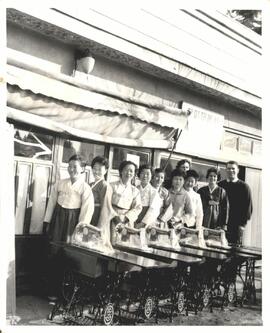Waltner’s papers are extensive and cover his career and service in great detail. Waltner discarded very little, and this is immediately evidenced by the detailed notes and student papers surviving for the classes he took at Bethel, the University of South Dakota, and all three seminaries where he studied. A handful of Winifred’s student papers are included. Both Erland and Winifred kept journals, and Erland actually retained his pocket calendars listing appointments for virtually his entire career. The most significant documentation of the Waltner family is their correspondence, especially some thirty years of nearly weekly letters from Erland’s father, Ben J Waltner. Also revealing the story of the Waltner family are the frequent letters between Erland and Winifred; corresponding whenever they were apart early in the marriage and whenever he traveled to his numerous speaking engagements. The demand for him to speak is documented by many hundreds of letters inviting him to speak, and far more invitations were received than he could accept. Perhaps of most interest to the historian will be Waltner’s extensive correspondence regarding the Mennonite Biblical Seminary and as a General Conference leader in the 1940s and 1950s. Included are details regarding the revival of the seminary and its early years in Chicago. Most significant are likely the negotiations with the Mennonite Church (Old Mennonites) regarding the move of the seminary to Elkhart and the early cooperative efforts, which includes a number of original letters with Harold S. Bender. Also of interest are a decade of letters from E. G. Kaufman trying to recruit Waltner to Bethel College, and letters from those trying to recruit him to the seminary at the same time. Waltner’s involvement with the Board of Education and Publication and numerous subcommittees will have overlapping documentation in the archives of the General Conference, but some materials are not duplicates. This is perhaps most true of the six years of correspondence as conference president. The Board of Missions papers are mostly duplicates of the conference archives, including many numbered and circular letters, but interspersed are some likely original letters not in the church archives. (The collection contains several folders of letters from other, mostly older, General Conference leaders which Waltner somehow acquired and retained). The correspondence and reports Waltner saved from his work with MCC and MWC are also significant although not extensive. He even has papers documenting the beginning of the Mennonite Medical Association (and for many years seemed to be the only non-doctor on the membership list). He was often the person called upon to represent the General Conference in inter-Mennonite activities in the fifties, sixties, and seventies. Waltner was a founder of the first General Conference Mennonite Church in Elkhart, Hively Avenue, and the collection contains materials related to the beginning of the church and its ongoing activities. One surprise might be that this collection does not contain significant documentation from Waltner’s two decades as seminary president - these official files from his administrative duties are at the seminary as they should be. Following his retirement, Waltner did continue to receive and retained a thorough set of faculty minutes and memos. Some of these communications with other faculty may be unique copies. What is definitely unique among Waltner’s seminary papers are the thousands of pages of lecture notes, course syllabi, student papers, exams, and other evaluations. These cover a period of nearly forty years (late fifties through early nineties) and provide insight into what was being taught at a very detailed level. Although perhaps less significant historically than the MBS and General Conference materials, this collection also documents the thinking and preaching of one of the most significant General Conference preachers of the twentieth century. As many as fifteen hundred to two thousand of his sermons have survived - most are in outline form on half sheets of paper and almost all have the place/occasion and date included. They are generally sorted by the scripture passage, i.e. all of the sermons on Mark, Psalms, Job, etc. Some are sorted by topic. However, they maybe found everywhere - so a folder for a seminary course on Peter may contain a handful of sermon outlines on Peter from the 1940s or 1950s. In one respect these sermons are important because only a decade of the over four decades of sermons were as a pastor of a congregation. The demand for Waltner to preach was overwhelming and it seems like he was preaching somewhere every Sunday, including not only at local congregations but also district conferences and a host of special events, such as ordinations, building dedications, commencements, and so forth.
A handful of Waltner’s early sermons in Mountain Lake were in German, and be preached in German during some of his earlier MCC and MWC travels in Canada, Europe and South America. Otherwise the collection is in English.



